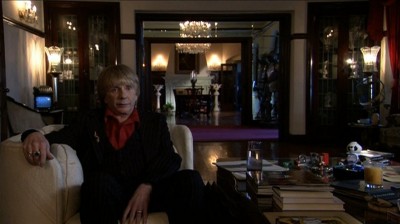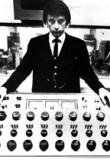| Reviews & Columns |
|
Reviews DVD TV on DVD Blu-ray 4K UHD International DVDs In Theaters Reviews by Studio Video Games Features Collector Series DVDs Easter Egg Database Interviews DVD Talk Radio Feature Articles Columns Anime Talk DVD Savant Horror DVDs The M.O.D. Squad Art House HD Talk Silent DVD
|
DVD Talk Forum |
|
|
| Resources |
|
DVD Price Search Customer Service #'s RCE Info Links |
|
Columns
|
|
|
Agony and the Ecstasy of Phil Spector, The

The Agony and the Ecstasy of Phil Spector is an odd documentary, all right; it's appropriate to its subject. Originally produced for BBC television, it profiles the legendary record producer, from his triumphs in the studio to his trial and conviction for the 2003 murder of Lana Clarkson, in an altogether unorthodox fashion. It's neither straightforward biography nor true crime investigation, and those looking for either should steer clear. Instead, it experiments with the very form of the documentary film, and offers a piercing and unguarded look at the disturbed psyche of a man who, guilty or not, had clearly lost touch with anything resembling reality.
Opening text explains that the Spector-produced songs in the film will play in full, to preserve their integrity, and that on-screen commentary will be provided by author Mick Brown. This got a quizzical head turn from several folks at my screening, but that's exactly what they do--the songs play all the way to the label (albeit underneath interviews and courtroom video), and Brown's verbose praise for the work is seen on the bottom of the screen, like a news ticker on a cable news network or something.
Though there are occasional--and peculiar--snatches of a 1977 interview (oddly discombobulated, lit and recorded with a haunting hollowness, as if shot from the rec room in purgatory), the bulk of the interview footage is taken from director Vikram Jayanti's 2007 interview with Spector, about a month before the first trial (that one ended with a hung jury; the 2009 retrial resulted in Spector's conviction). He touches on his current troubles, but spends most of the interview talking about his past, his triumphs, his records, his many accomplishments. He's certainly not modest--at various points, he compares himself to Gershwin, Bach, Berlin, Galileo, DaVinci, and Michelangelo. He recalls the circumstances of the sessions, what he tried to achieve with his songs, the labor and pain of pulling them off. And he grinds his axes, spouting off his strange and petty jealousies and vendettas against Tony Bennett, Bob Dylan, Buddy Holly, Martin Scorsese, Brian Wilson, Paul McCartney ("He got me mixed up with somebody who gives a shit"), the producers at Motown.
The interviews are candid, sometimes funny (his thoughts on Woody Allen are uproarious), sometimes batshit insane, always fascinating. He's lived in his bubble for so long, he doesn't realize how telling his talking jags and plain-spoken insecurities are; when he explains that "You've Lost That Lovin' Feelin'" is the most programmed song in radio history, he names all the composers that means he's bested--and then immediately insists, "But I don't dwell on that!"
And then there's the music. Those perfect original recordings have never sounded better, and they're frequently interspersed with fabulous old TV performances and concert clips--including Spector himself, all of 18 years old, performing "To Know Him Is To Love Him" on television with the Teddy Bears. The power of the music is undeniable; it retains its power to move, and to thrill.
But director Jayanti intermingles those fond remembrances in the interviews, and the roaring soundtrack of those years (the music is basically non-stop, a wall-to-wall "Wall of Sound"), with long sections of the televised 2007 trial. He's not constructing a document of that legal proceeding--in fact, he seems entirely disinterested in the details and logistics of the case. We see Spector in court, we hold on his face; we see exhibits displays, witnesses testifying. But there are no specifics (indeed, the other players in this drama aren't even identified by name, but by title--"The Judge," "The Prosecutor," "The Girlfriends," etc.), and the filmmakers seem interested more in the mundanities of the legal grind. Essentially, the courtroom footage functions as B-roll for the music, which dominates the soundtrack--and it is primarily ironic B-roll, oogily juxtaposing those peppy pop songs with the dour situation and surroundings. It's all a bit disorienting; we hear "And Then He Kissed Me," we see Brown's on-screen text, describing it as "the closest thing to perfection pop music has produced," but it's illustrated by his ex-girlfriends on the stand describing his violent nature, snatches of gunplay testimony, and experts demonstrating how the blood would spray if/when he pulled the trigger.
The technique can get wearying--we want to know more about the case, to understand how and why this thing happened. (The view we do get of the trial certainly seems sympathetic to the defendant.) But the filmmakers find clever ways to make the incongruity work (they make pretty ingenious use of Lennon's "God," for example). What's more, they end up creating a powerful kind of parallel storytelling; he's talking about his records, his life, his past, but the visuals starkly contrast that rose-colored history with his shattered present. The Agony and the Ecstasy of Phil Spector may not bring off its conventional documentary elements, and leave the viewer looking for more fact and investigation. But as an up-close psychological profile, it is startling, probing, and insightful.
Jason lives in New York. He holds an MA in Cultural Reporting and Criticism from NYU.
|
| Popular Reviews |
| Sponsored Links |
|
|
| Sponsored Links |
|
|
| Release List | Reviews | Shop | Newsletter | Forum | DVD Giveaways | Blu-Ray | Advertise |
|
Copyright 2024 DVDTalk.com All Rights Reserved. Legal Info, Privacy Policy, Terms of Use,
Manage Preferences,
Your Privacy Choices | |||||||











